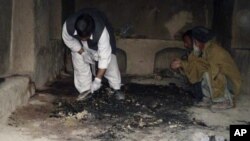What are the implications of the weekend killings of 16 Afghan civilians by a rogue U.S. soldier in southern Afghanistan? RFE/RL correspondent Abubakar Siddique asked Thomas Ruttig, a former UN and European diplomat and the director of the Afghanistan Analysts Network.
RFE/RL: This incident comes on the heels of recent violent Afghan protests over the burning of copies of the Muslim holy book, the Koran, at a NATO base. How important is this incident in defining the broader relations between Afghanistan and NATO?
Thomas Ruttig: Of course, it is politically significant but not, in the first place, for the relations between the U.S. and the Afghan government. That is what most of the media say. It is more significant for the relations between the U.S. and the Afghan population.
It is the Afghan population, which as General [John] Allen, the ISAF (International Security Assistance Force) commander yesterday reiterated, they are there to protect. But they are not protecting them if they cannot prevent things like these killings from happening.
RFE/RL: Afghan lawmakers and officials are demanding that the perpetrator of these killings be tried in an Afghan court. How do you look at such demands?
Ruttig: I can understand that Afghan parliamentarians are angry and demand a trial. They have seen too often that U.S. soldiers who have been involved in attacks on Afghans have not been convicted. But on the other hand, I also do not have trust in the Afghan judicial system. So that's a populist demand, and I don't think it will happen. I don't think it should happen. But I understand fully that people in Afghanistan might demand that.
RFE/RL: Afghan President Hamid Karzai recently made encouraging remarks about the possibility of a long-term strategic partnership agreement with Washington, saying it should be signed soon. Do you think this incident undermines prospects for this agreement?
Ruttig: The incident itself will not make certain negotiations about the agreement itself easier because it strengthens the hand of Karzai. But I even would go as far [as to] say that at the moment, we should not even link it to each other. It is just an incident which should be taken as itself and should be dealt with and we should think about what it signifies and what can be done to prevent these things from happening.
RFE/RL: During the past decade we have seen many incidents of Afghan civilian casualties. What needs to happen to stop them now?
Ruttig: Civilian casualties can only be prevented by a fundamental change of the approach of the military and of the politicians in the West because they are setting the framework for the military. The whole Afghanistan issue is still taken as a military problem. There are still attempts to solve it militarily and this will produce incidents like that.
| Find more coverage at RFE/RL |




